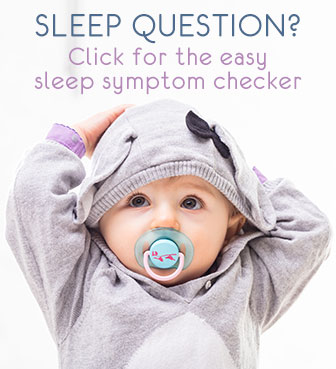Dealing with jaundice in newborns
Author Name: Heidi Holvoet, PhD
Jaundice in newborns is common and usually harmless but may need treatment. High bilirubin levels can be toxic and cause brain damage. So it's important to recognize severe jaundice symptoms and get timely treatment if necessary.
What is jaundice in newborns?

With jaundice your newborn baby's skin will have a light yellow shine.
Usually you see it most at her head but the coloring can 'move down'
towards her arms and chest. Often the whites of baby's eyes are also
yellowish.
50-60% of all newborns show clear signs of yellow coloring, some a lot,
some barely noticeable.
Most often this is
physiological
jaundice,
caused by the naturally high bilirubin levels right
after birth.
Bilirubin, a yellow pigment, is a product from normal red blood cell
processing in our body. In pregnancy, breaking down bilirubin is taken
care of by mommy's liver entirely.
Only right after birth does baby's liver take over. But it takes time
to be all efficient and that explains the high bilirubin levels and the
skin coloring.
Besides this common form, other causes of jaundice in newborns include
mother-child blood incompatibilities, too little milk intake, in some
cases specific breastmilk composition and rare liver or intestine
disorders.
Recognizing jaundice in newborns
Logically the first and simple symptom is yellowish skin and
eye-whites. The yellow can be very subtle. A good test is to press your
finger onto baby's skin. Normal skin will go whitish right after this
but yellow skin will stay yellow.
The yellow coloring will start at baby's head. As bilirubin levels
rise, the coloring will move down towards chest, arms, belly and legs.
'Below the abdomen' is considered a dangerous level, see below.
Timing is also helpful to recognize and diagnose:
- Physiological jaundice, the common harmless form, appears between day 2 and 3 after birth with a peak between day 2 and 4. It is usually gone by the age of 2 weeks.
- Jaundice related to breastmilk composition will start around day 7 , peak at 2-3 weeks and can last longer than a month.
- Forms of jaundice that appear in the first 24 hours after birth are rare but serious. Your doctors will closely monitor your baby and find out what is causing it. This may be a mother-child blood incompatibility or else caused by an infection or intestinal disorder.
Consult your pediatrician ASAP when your baby is extremely sleepy, barely
arouses to drink, feeds very little, has a high-pitched cry, has a
fever and/or is very 'floppy' with moments of strongly arching head and
back.
This may point to dangerously high bilirubin levels and a condition
named
kernicterus
which can cause permanent brain damage.
Jaundice treatment
Your pediatrician will advise you what to do and it is absolutely critical
that you take your baby to a doctor if you notice any sign of yellow
coloring in your young baby.
Putting your baby in a bright place near a window, with little clothes
on and feeding very very frequently are the first-aid actions. Do this
in any case if you notice jaundice and while awaiting the doctor's
consult. But
don't trust
that it is enough until your doctor confirms
.
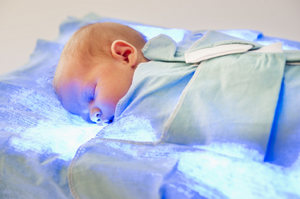
If the jaundice is more severe, your doctor may advise light
therapy, or photo therapy.
Bright blue lights are then used to help
reduce bilirubin levels and so reduce the yellow coloring.
This can be done with a photo therapy blanket at home or light therapy
in the hospital.
Drinking frequently, whether breast milk or formula, is always very
important - the body gets rid of bilirubin through urine or with bowel
movements.
Article Author: Heidi Holvoet, PhD - Founder, senior sleep consultant

Heidi Holvoet, PhD, is the founder of the Baby Sleep Advice website and movement, an award-winning author, baby & toddler sleep consultant with 17+ years experience as well as a certified lactation counselor.
Over the years, Heidi has received several awards inluding a Mom's Choice Award (MCA) and National Parenting Awards (NAPPA) for her Baby Sleep Advice website, programs and books. Also, Baby Sleep Advice was awarded "Most Trusted Infant's Sleep Solutions Company 2023" in the Benelux Enterprise Awards 2023.
Heidi continually conducts personal research and participates in continued education and in that way stays up to date with current scientific and pyschosocial infant care.
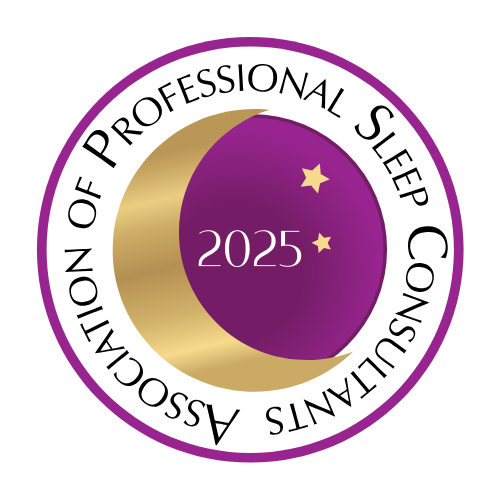
She is also a member of the Association of Professional Sleep Consultants of which she was one of the earliest contributors. She obtained her PhD degree in physics at the University of Ghent in Belgium.
Heidi is passionate about helping babies and their parents sleep more and better, with her trademark holistic and truly-no-tears approach that has been proven and praised time and again by parents worldwide to be effective and truly no-tears. Respect for you as a parent and your baby, is at the heart of Heidi's warm and kind support. Her approach always keeps in mind a baby's needs and abilities at any given age, is based on pediatric science and the most up to date knowledge in infant care and sleep science.
As well as the award-winning baby sleep programs, Heidi offers popular 1:1 consults and easy-access 30-minute SOS Sleep sessions.
Recognizing and treating kernicterus
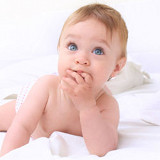
Baby waking every hour?
by Heidi Holvoet, PhD
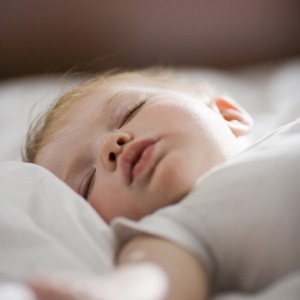
Sleep schedules by age
by Heidi Holvoet, PhD

Separation Anxiety
by Heidi Holvoet, PhD
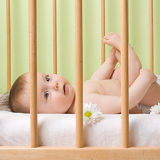
Crib safety guidelines
by Heidi Holvoet, PhD
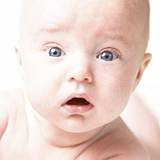
Why does my baby wake up every hour?
by Heidi Holvoet, PhD

